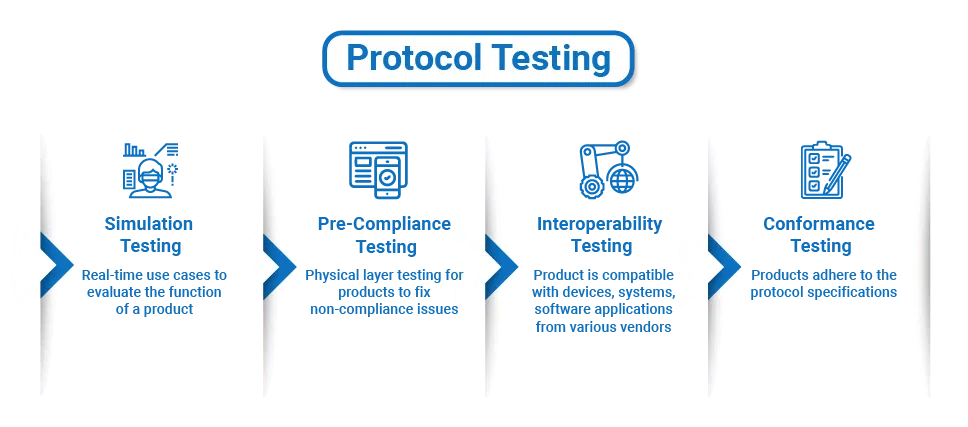Protocol testing is used to check if a hardware or software product is working as per the communication protocol standard and purpose. The goal of this testing process is to inspect and check if the packets are transmitted and received as per the protocol specification.
The three basic protocol testing checks are:
- Correctness: To check if the packet is received as expected
- Bandwidth: To check how many packets were sent per time unit (mostly a second)
- Latency: To check how long it takes for a packet to be transmitted across a network
The most common types of protocol testing are:
- Conformance testing: Performed to evaluate if the products adhere to the protocol specifications
- Interoperability testing: Performed to check if the product is compatible with devices/systems/software applications from various vendors
- Simulation testing: Scenarios are created similar to the real-time use cases to evaluate the function of a product
Why Protocol Testing Services are Required for Industries?
Industrial OEMs of hardware and software products stand to gain a competitive edge in the market and a huge possibility of an increased market share by leveraging interoperability testing services that evaluate their products for interoperable functioning with other products in its ecosystem. There are several benefits of protocol testing for industrial vendors:

Protocols Adhere to Industry Standards
Interoperability is one of the most essential needs of a connected system. This testing helps evaluate if the various devices in a network are interoperable and meet industry standards.

Assess Risk
Industrial devices and systems face security risk with the increasingly thin boundary between IT and OT. It is important to check devices and systems for access control and open ports that could become vulnerable points for cyberthreats. This testing also helps check if there is any interference from other devices that could disrupt performance. Industries can leverage protocol testing to check if there are any such potential risk areas and correct them in advance. It also helps build a secure connected system.

Evaluate Security
Security breaches are one of the biggest challenges faced by connected networks. Design flaws, weak software systems and unencrypted communication can lead to security issues. Protocol testing helps identify the weak links in the network to prevent the possibility of cyber threats and security breaches.
Protocol Testing Services Provided by Utthunga
With extensive knowledge and deep understanding of protocols, Utthunga offers a wide array of protocol testing services. Our capabilities cover conformance testing, interoperability testing, pre-compliance testing for different industry protocols (standard or proprietary).

We offer
- Performance testing
- Bandwidth tests
- Latency checks
- Correctness testing
- Data logging and analysis (ex. Wireshark)
- Stability and durability testing
- Simulation tests
- Security testing (TLS 1.2 connection, AES 128-bit end to end encryption, etc.)
- Time domain testing
- Jitter tests
- Loopback testing
- Signal analysis – eye diagram interpretations
- Amplitude domain testing
Apart from the above services, we also offer
- End-to-end product compliance verification as per certification standards
- Evaluation of performance, time criticality, fault recovery, reliability, endurance from functionality perspective and protocol perspective
- Provide support to obtain certifications from the respective certification agencies
- Interoperability testing with different systems
- Design and development of test jig and verification on the test jig
Why Utthunga for Protocol Testing Services
Our team of test engineers have extensive domain knowledge and expertise to conduct thorough protocol testing to ensure conformance and interoperability of the products. We offer an extensive suite of protocol testing services and intensive testing solutions to ensure quality of your products. We will help close the gaps in the product performance and help you gain a competitive advantage.
A few of our strengths in the area of protocol testing:
- Experience with multiple industrial devices/controllers, communication protocols and various industry standards
- Experience with time critical and performance critical evaluation of products
- Ability to suggest and implement efficient design implementations to achieve the target performance and time criticality
- We provide functional, system and integration testing of the devices and their configuration tools
- We offer pre-compliance testing of the devices and suggest how to fix non-compliances
FAQs
1. What are the benefits of interoperability testing in IIoT?
The success of IIoT (Industrial Internet of Things) depends on the “things” conforming to global standards and specifications. This will ensure the ecosystem of devices and applications work seamlessly and securely with each other. Interoperability testing will ensure that all the “things” or nodes in the connected system adhere to accepted standards and function as expected. One weak or non-compliant node in the system can lead to a less the optimal functioning of the overall system.
